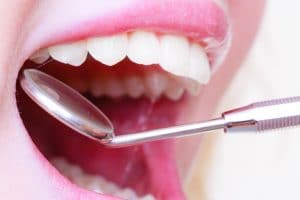 Bruxism, or chronic teeth-grinding, is a more common problem than many people realize. It can also occur in various forms, such as daytime and nighttime bruxism, that might make identifying the problem on your own more difficult. For example, if you have nighttime bruxism, it means the problem of constantly grinding your teeth occurs most often while you sleep at night. Not only will you fail to notice the problem, but it can also have enough time to lead to more significant tooth damage by the time you identify it and seek treatment. (more…)
Bruxism, or chronic teeth-grinding, is a more common problem than many people realize. It can also occur in various forms, such as daytime and nighttime bruxism, that might make identifying the problem on your own more difficult. For example, if you have nighttime bruxism, it means the problem of constantly grinding your teeth occurs most often while you sleep at night. Not only will you fail to notice the problem, but it can also have enough time to lead to more significant tooth damage by the time you identify it and seek treatment. (more…)
Why You Shouldn’t Let Gum Disease Get Worse
 When something troublesome occurs with your oral health, it’s typically best to address the concern as soon as possible with appropriate dental treatment. Otherwise, the consequences of it can grow worse, and the extent of your treatment can grow more intensive. In the case of gum disease, this is especially true, as severe gum disease is the leading cause of adult tooth loss and a significant factor in several other systemic health risks. Today, we take a closer look at why you shouldn’t allow gum disease to get worse if you notice its presence, or if your dentist detects it during your routine dental checkup and cleaning appointment. (more…)
When something troublesome occurs with your oral health, it’s typically best to address the concern as soon as possible with appropriate dental treatment. Otherwise, the consequences of it can grow worse, and the extent of your treatment can grow more intensive. In the case of gum disease, this is especially true, as severe gum disease is the leading cause of adult tooth loss and a significant factor in several other systemic health risks. Today, we take a closer look at why you shouldn’t allow gum disease to get worse if you notice its presence, or if your dentist detects it during your routine dental checkup and cleaning appointment. (more…)
Tips to Make Your Natural Teeth More Resilient
 While there is no single dental treatment to help everyone avoid dental health concerns, there are certain things that everyone needs to achieve that goal. For example, a consistent routine of good dental hygiene at home and a regular schedule of preventive dental checkups and cleanings go a long way in preventing the things that can lead to issues like cavities, gum disease, and more. For your preventive dental efforts to succeed, it’s important to ensure your natural teeth remain healthy and resilient, and these few tips can help improve your chances of success. (more…)
While there is no single dental treatment to help everyone avoid dental health concerns, there are certain things that everyone needs to achieve that goal. For example, a consistent routine of good dental hygiene at home and a regular schedule of preventive dental checkups and cleanings go a long way in preventing the things that can lead to issues like cavities, gum disease, and more. For your preventive dental efforts to succeed, it’s important to ensure your natural teeth remain healthy and resilient, and these few tips can help improve your chances of success. (more…)
Why Choose Dental Implants for Your Restoration?
 When people experience tooth loss, they may choose to replace their lost teeth for different motivations. For some people, the biggest concern is restoring their smiles’ appearance and regaining their self-confidence. For others, it may be restoring proper balance and function to their bite so they can enjoy their favorite foods once again. These and many other factors can only be addressed by replacing your lost teeth with a highly lifelike restoration. For optimal results, more patients are choosing dental implants to create the most lifelike replacements for their lost teeth. (more…)
When people experience tooth loss, they may choose to replace their lost teeth for different motivations. For some people, the biggest concern is restoring their smiles’ appearance and regaining their self-confidence. For others, it may be restoring proper balance and function to their bite so they can enjoy their favorite foods once again. These and many other factors can only be addressed by replacing your lost teeth with a highly lifelike restoration. For optimal results, more patients are choosing dental implants to create the most lifelike replacements for their lost teeth. (more…)
Times When You May Be More Likely to Lose a Tooth
 It’s difficult to predict if and when you might develop a concern with your oral health. That’s one reason why it’s important to stick to a regular schedule of preventive visits with your dentist. During each visit, your dentist can thoroughly examine your teeth, gums, and oral tissues to determine if a problem exists, and what treatment option can help you stop it from progressing. This can also help you more successfully control your risks of tooth loss, many of which stem from the development of common concerns like tooth decay and gum disease. (more…)
It’s difficult to predict if and when you might develop a concern with your oral health. That’s one reason why it’s important to stick to a regular schedule of preventive visits with your dentist. During each visit, your dentist can thoroughly examine your teeth, gums, and oral tissues to determine if a problem exists, and what treatment option can help you stop it from progressing. This can also help you more successfully control your risks of tooth loss, many of which stem from the development of common concerns like tooth decay and gum disease. (more…)
Things that Dental Crowns Are Often Recommended For
 Some common dental restorations are designed to restore a specific part of your tooth’s structure. For instance, a tooth filling is only made to fill a cavity and restore the part of your tooth that lost structure to it. However, a dental crown is a more comprehensive restoration that’s designed to completely restore the entire crown structure of your tooth. For example, if a tooth is significantly damaged, blemished, or lost, then the right custom-made dental crown may be the ideal solution for restoring, improving, or replacing it with optimal results. (more…)
Some common dental restorations are designed to restore a specific part of your tooth’s structure. For instance, a tooth filling is only made to fill a cavity and restore the part of your tooth that lost structure to it. However, a dental crown is a more comprehensive restoration that’s designed to completely restore the entire crown structure of your tooth. For example, if a tooth is significantly damaged, blemished, or lost, then the right custom-made dental crown may be the ideal solution for restoring, improving, or replacing it with optimal results. (more…)
Why Dental Restorations Are Designed to Be Lifelike
 Not all oral health concerns create highly noticeable impacts to your smile’s appearance. For instance, conditions like tooth decay and gum disease may not become visibly obvious until they’ve reached their more severe stages. However, when a tooth is damaged or its visible structure is compromised, the impact is often visible. One of the reasons why modern dental restorations are designed to be more lifelike in their appearance is to address this impact and restore your confidence in your smile. However, restorations that are designed to mimic your healthy, natural teeth more closely are often more beneficial to your teeth and oral health in several other, more important ways. (more…)
Not all oral health concerns create highly noticeable impacts to your smile’s appearance. For instance, conditions like tooth decay and gum disease may not become visibly obvious until they’ve reached their more severe stages. However, when a tooth is damaged or its visible structure is compromised, the impact is often visible. One of the reasons why modern dental restorations are designed to be more lifelike in their appearance is to address this impact and restore your confidence in your smile. However, restorations that are designed to mimic your healthy, natural teeth more closely are often more beneficial to your teeth and oral health in several other, more important ways. (more…)
Why All Types of Tooth Damage Are Serious
 With certain types of concerns with your teeth, the severity of the problem can be determined by how much of your tooth structure is affected by it. For example, a tooth that has a small piece chipped off of its surface may not seem like it’s in serious trouble, even if the chipped part of the tooth is highly visible. However, the truth is that any form of damage to your tooth’s natural structure should be taken seriously. Given enough time, even seemingly minor damage can become much more severe, and pose a much greater threat to your overall oral health. (more…)
With certain types of concerns with your teeth, the severity of the problem can be determined by how much of your tooth structure is affected by it. For example, a tooth that has a small piece chipped off of its surface may not seem like it’s in serious trouble, even if the chipped part of the tooth is highly visible. However, the truth is that any form of damage to your tooth’s natural structure should be taken seriously. Given enough time, even seemingly minor damage can become much more severe, and pose a much greater threat to your overall oral health. (more…)
Reasons Why People Choose Invisalign® Clear Aligners
 Sometimes, it can seem easier to just ignore crooked teeth than to undergo treatment to straighten them. That’s often because the orthodontic treatment that’s traditionally recommended for straightening crooked teeth often involves the use of braces that consist of metal brackets and wires. For some adult patients, the potential inconvenience of braces can make them hesitate to receive them, despite the importance of addressing tooth misalignment as soon as possible. This is also one of many reasons why some adult patients can benefit significantly from choosing Invisalign® clear aligners as their treatment. (more…)
Sometimes, it can seem easier to just ignore crooked teeth than to undergo treatment to straighten them. That’s often because the orthodontic treatment that’s traditionally recommended for straightening crooked teeth often involves the use of braces that consist of metal brackets and wires. For some adult patients, the potential inconvenience of braces can make them hesitate to receive them, despite the importance of addressing tooth misalignment as soon as possible. This is also one of many reasons why some adult patients can benefit significantly from choosing Invisalign® clear aligners as their treatment. (more…)
Perfecting Your Smile With Porcelain Veneers
 Keeping up with your smile’s appearance can seem like a difficult feat, especially now in the midst of the Coronavirus pandemic. While advanced dental technology makes it much easier to address a few blemishes, and the cosmetic process of teeth whitening helps to restore that radiant shine, having multiple blemishes that appear to require different treatment options can still make the process complicated. Fortunately, the team at Dreem Dentistry in Leawood, KS understands this dilemma, which is why we recommend considering porcelain veneers to restore your grin.
Keeping up with your smile’s appearance can seem like a difficult feat, especially now in the midst of the Coronavirus pandemic. While advanced dental technology makes it much easier to address a few blemishes, and the cosmetic process of teeth whitening helps to restore that radiant shine, having multiple blemishes that appear to require different treatment options can still make the process complicated. Fortunately, the team at Dreem Dentistry in Leawood, KS understands this dilemma, which is why we recommend considering porcelain veneers to restore your grin.






